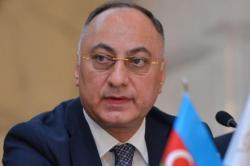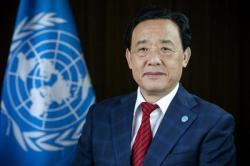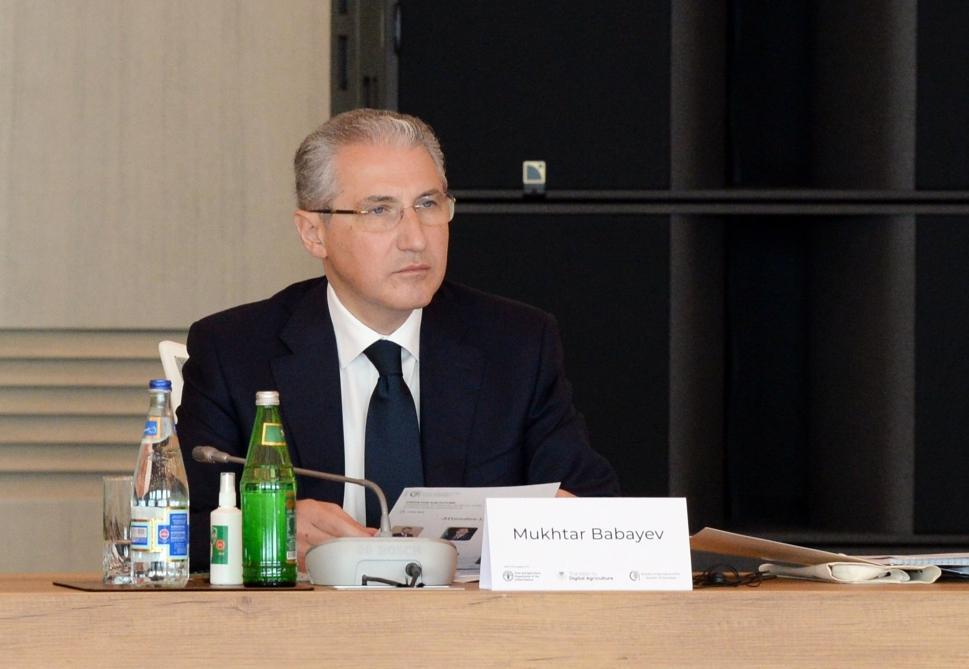
Minister: Karabakh Liberation Marks New Age In Agricultural Development
Azerbaijani Ecology and Natural Resources Minister Mukhtar Babayev has said that the liberation of Karabakh is marking a new stage in the agricultural development of the country, Azertag has reported.
Babayev made the remarks at the“Vision for the future: transition to digital agriculture' international conference held with the support of the UN Food and Agriculture Organization (FAO) in Baku on May 6.
He stressed that the liberation of Azerbaijani territories from occupation has marked a new stage in the development of agriculture. The occupation of a part of Azerbaijani lands by Armenia for 30 years has had a negative impact on the forests, biodiversity, and water resources of the country. Azerbaijan aims to carry out reforestation measures in the liberated areas and to prevent climate change and soil degradation.
The minister emphasized the great agricultural potential of the liberated lands, adding that Azerbaijan is taking relevant measures to create a green economy, eco-friendly villages, and cities there.
Babayev recalled that Azerbaijan had announced a plan of establishing a net zero-emission zone in the liberated areas by 2050 at the 26th conference of the UN Framework Convention on Climate Change in Glasgow, Scotland, in November 2021.
He stated that cooperation with the FAO has already yielded considerable achievements, and expressed optimism for future constructive cooperation.
Highlighting the strategic importance of the sector, Babayev stated that agriculture plays a crucial role in the economic development of Azerbaijan. The shift to digital agriculture is critical not just for agricultural progress, but also for the future food market and consumer demand. It also marks the start of a significant future process - developing inclusive agriculture without damaging the environment, he added.
Babayev pointed out that agriculture is a sector that requires water consumption, as well as information on the sustainable use of natural resources. Azerbaijan is one of the countries suffering from water shortages and digital agriculture is critical to meeting the growing demand for water in the future.
The minister said that climate change, including water loss, has led to soil degradation and erosion. Therefore, the technology of efficient use of water and the proper use of agricultural land is very important.
'We have created early warning systems to ensure the resilience of this sector. These systems also serve to prevent particularly dangerous meteorological events. The Ministry of Ecology and Natural Resources is working with the Ministry of Agriculture to ensure the sustainability of this important sector. An action plan has been developed and is currently in use,” Babayev stressed.
Addressing the event, Azerbaijan's Food Safety Agency (FSA) Chairman Goshgar Tahmazli stated that the digitalization of agriculture in the country is improving rapidly and the process will be given special attention.
The FSA has achieved significant progress over recent years in ensuring food security and increasing Azerbaijan's export potential, he stressed.
'So, we control food security in accordance with international standards, and cooperation has been established with a number of foreign organizations,' Tahmazli said.
Moreover, electronic identification of farm animals was launched in 2021 as part of a project to strengthen agricultural activities.
'This allowed ensuring control over the health of farm animals and the quality of their nutrition, as well as over a number of other indicators. Therefore, we'll be able to improve the quality of products supplied to the market. Such a project has been implemented in Baku and Sumgayit to date,” the chairman added.
Tahmazli further mentioned that Azerbaijan has implemented rigorous controls on food imports and exports.
'This will ensure transparency and efficiency of doing business in the food industry,' he said.
Furthermore, addressing the conference, UN Food and Agriculture Organization (FAO) Director-General Qu Dongyu stressed that cooperation with Azerbaijan is aimed at achieving sustainable development goals.
Expressing his gratitude to Azerbaijan for carrying out digitalization reforms in the agricultural sector, Dongyu stated that the digitalization of agriculture and the introduction of innovations are the main activities of FAO.
'Today, FAO's agenda includes free access to digital data, virtual education, and digital literacy,' Dongyu said.
The director-general expressed optimism about Azerbaijan's efforts, opining that they would yield positive results.
Baku hosts the“Vision for the Future: Transition to Digital Agriculture' international conference that is attended by the Director-General of the Food and Agriculture Organization of the United Nations (FAO) Gu Dongyu and a number of agriculture ministers and heads of international organizations from various member countries.
The conference includes panel discussions on 'E-government services in agriculture - a transition point for rural development, digitalization and modernization',“Accelerating Digital Agriculture: challenges, perspectives and sustainable roads to information, accessibility and ethical use”, as well as a ministerial roundtable on 'Digitalization in Agriculture: A way forward, approaches to adaptation and best practices'.
---
Follow us on Twitter @AzerNewsAz


- #AGRICULTURAL COOPERATION
- #MUKHTAR BABAYEV
- #FAO
Legal Disclaimer:
MENAFN provides the
information “as is” without warranty of any kind. We do not accept
any responsibility or liability for the accuracy, content, images,
videos, licenses, completeness, legality, or reliability of the information
contained in this article. If you have any complaints or copyright
issues related to this article, kindly contact the provider above.

















Comments
No comment